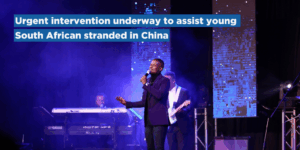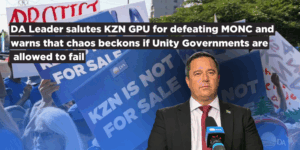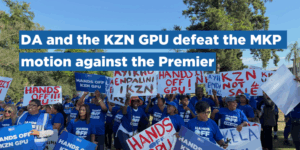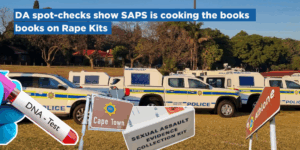Oudtshoorn Municipal Council approved final drought water tariffs for the financial year 2017/2018 to be implemented once the Koos Raubenheimer dam is below 50% full.
Currently the Western Cape and Southern Cape are experiencing its worst drought in almost thirty (30) years. This is due to sudden climate changes, especially the El Nino Weather Conditions, whereby warmer or colder than average ocean temperatures in one part of the world can influence weather around the globe. Oudtshoorn is currently directly influence with this change in weather conditions, and the annual rainy seasons produced lesser rain than normal.
The Raubenheimer day has risen from 48% to 62% full following the recent rains during the past two weeks. Council has, however, proceeded with the implementation of the water savings measures with immediate effect. However, the tariff increase will only apply once the dam level is below 50%. Consumers will be informed in advance of the implementation of the tariff increase, through communication channels and media.
This is how the drought water tariffs will be implemented:
Stage 1 (Raubenheimer dam less than 50% to 40% full)
Charges increase of 10% will be implemented when consumption is above 15 000 liters per month. This applies to indigent using more than 15 000 liters per month and non-indigent households.
Residential group housing such as flats, schools and retirement villages will also experience a tariff increase of 10%.
For commercial, industrial and state properties, a 10% increase will be effective once they exceed 75kl consumption per month. Meanwhile, sport clubs/municipal properties will be charged an increase of 10% once the consumption exceeds 150 000 liters.
An increase of 10% will also be applicable to sales to farmers for households’ use.
Stage 2 (Raubenheimer dam less than 40% down to 30% full)
Thirty per cent (30%) increase will be implemented when consumption exceeds 6000 liters per month. This applies to indigent using more than 6000 liters per month and non-indigent households.
Residential group housing such as flats, schools and retirement villages will also experience a tariff increase of 30%.
For commercial, industrial and state properties, a 30% increase will be effective once they exceed 75kl consumption per month. A 30% increase will be applicable to Sport clubs/municipal properties once this stage is reached; this also applies to sales to farmers for households’ use.
Stage 3 (Raubenheimer dam less than 30% full)
75% increase when consumption exceeds 6000 liters per month. This applies to indigent using more than 6000 liters per month and non-indigent households.
Please note that all households registered as indigent get the first 6000 liters of water free of charge.
A 75% increase will be implemented at:
- Residential group housing such as flats, schools and retirement villages will also experience a tariff increase of 75%.
- Commercial, industrial and state properties,
- Sport clubs/municipal properties once this stage is reached; and
- Sales to farmers for households’ use.
Water savings measures to be implemented immediately are as follows:
- The use of municipal potable water for watering gardens, lawns, parks and public open spaces is restricted to a maximum of one hour per day which may only take place between 07h00 and 10h00 in the morning or between 18h00 and 19h00 in the evening.
- Nurseries, vegetable gardens, sports stadiums, golf putting greens and cricket pitches are exempt from the one hour per day restriction.
- The watering of any vegetation is prohibited between 10h00 and 18h00 and this restriction applies to everyone.
- Garden hoses may not be used for the washing of motor vehicles and equipment as well as the hosing down of paved, concrete or tarred surfaces. This restriction does not apply to business enterprises whose operation necessitates this.
- The use of potable water deriving from the KKRWSS’s underground water sources may only be used for drinking and general household purposes, including livestock watering.
- The use of this water source is prohibited for the irrigation of farm lands, gardens, lawns, parks and open spaces. The washing of motor vehicles or equipment and the hosing down of any paved surfaces or other structures are forbidden.
- Residents are encouraged to make use of as much of their grey water as possible.
- Residents who make use of their own underground water must display a clear notice on the premises with the wording “BOREHOLE WATER”.
Both the drought water tariffs and the water restriction have been structured in such a way that it promotes use of water sparingly. The Municipality will also embark on a communication and stakeholder engagement campaign in support to educate consumers to use water conservatively.




